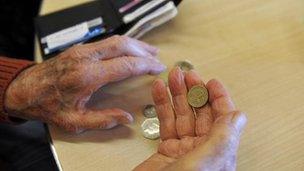Pensions: Steve Webb defends reforms for new spouse claimants
- Published

Pensions minister Steve Webb has said plans to reform the pensions system will save hundreds of millions of pounds in the long term.
From 2016, entitlement to a state pension will depend on an individual's own contributions, rather than the employment record of their spouse.
Mr Webb said some 200,000 overseas residents receive this payment at a cost of £410m a year.
But the change will equally affect spouses in the UK.
The measure to be announced in the Queen's Speech on Wednesday will not affect existing claimants.
'Odd situation'
The Pensions Bill will introduce a new flat rate pension based on individual contributions during a person's working life.
Current rules allow spouses who have not paid their own National Insurance contributions to claim a "married person's allowance" of up to £66 per week based on their husband or wife's history of NI contributions.
Earlier, in an interview with the Daily Telegraph, Mr Webb highlighted that some of those claiming a married person's allowance had never been to the UK, and this was unfair.
He later defended the fact the government had focused on people living abroad who are married to British citizens - even though the policy will affect people in this country too.
The minister said he had focused on that because the number of women in the UK claiming a pension based on their husband's record is falling steadily, while the number overseas is rising.
"We've got this rather odd situation where more and more of these pensions based on a spouse's record are people who may never have put anything at all into the system in the UK.
"It's not about their nationality, it's about whether they have put into the British system," he told BBC Radio 4's World at One.
He said of more than 200,000 pensions paid outside the UK, more than half of them were to people who had "never put a penny" into the British system.
Mr Webb said rules would now apply equally abroad and in the UK.
"These changes will affect fewer and fewer people in the UK - because if you've spent your time here you build up a pension yourself - but they are affecting more and more people outside the UK who have never put anything into the system and that seems to us not fair," he said.
When asked if he highlighted the issue now to appeal to voters who were disillusioned with "help given to foreigners from the UK benefits system", he said: "Not at all - we are publishing the bill on Thursday... and we're looking at aspects of the system that we think are not fair that we are changing."
'Limited impact'
Former Conservative Party chairman David Davis said: "We should be very very careful we don't create injustices" for future generations.
However, Tom McPhail, head of pensions research at Hargreaves Lansdown, said that, as the current pension system is being replaced anyway, Mr Webb's plans would have a limited impact.
"From 2016 onwards the state pension will be based entirely on your individual record and there will be no inheritance of state pension rights," he said.
British pensioners and their families who currently live overseas and make such claims would not be affected.
Norman Cudmore, who served in the RAF for 22 years and worked overseas for another 16 years, lives in the Philippines with his Filipina wife.
Norman Cudmore, a British expat: "When I die my wife will get nothing"
"I have contributed to the UK pension scheme for all those years and will qualify for a state pension. I did this so my wife would have some security when I finally pass away," he told the BBC.
The government's overhaul of the state pension system will see a single-tier pension - of £144 a week at today's prices - being paid to every qualifying new pensioner from April 2016 at the earliest.
While many people will gain as a result of any changes, some who currently pay into a second state pension - which is being abolished - will lose out.